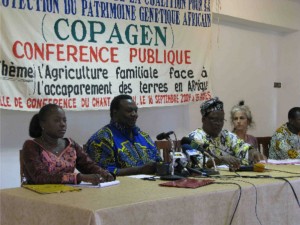
Fatou Mbaye (Senegal), Ibrahim Ouedraogo (Côte d'Ivoire), René Ségbénou (Benin), Renée Vellvé (Philippines) and Mamadou Goïta (Mali) during the public conference organised by COPAGEN, 16 September 2009, in Cotonou, Bénin.
Coalition for the Protection of Africa's Genetic Heritage (COPAGEN)
Preliminary declaration on family agriculture and land grabbing in Africa
Issued at the public conference on "Family agriculture and land grabbing in Africa" at Chants d'Oiseaux, Cotonou, on 16 September 2009
PRELIMINARY DECLARATION Cotonou, 16 September 2009 Africa has long been the object of greed by people from other continents. Its people have been enslaved and used as labour in plantations in the Americas. The West has massively exploited Africa's mineral resources (such as oil, gold, diamonds, copper, uranium, bauxite) for its own industrial development. Africa's agriculture has generally been geared for exports and its forests have served the same purpose. Today we are witnessing a new phenomenon: land grabbing, with the purchase or very long-term leasing (30-99 years) of large areas of agricultural land by foreign countries, transnational companies and private national companies. It is happening because agriculture has become strategically important since the food crisis, the increase in oil prices and the financial and stock market crises. All continents are being affected by this phenomenon, for it is visible in Eastern Europe, Asia and Latin America. But, as usual, Africa is more exposed than the other continents and is thus being affected more. In the two years since the turmoil of the food and financial crises, rich countries have mobilised more than 100 billion dollars to acquire land. In our own continent, most countries have made significant investment in reforming land legislation and establishing rural land plans. All of the newly created regulatory frameworks legalise the sale of massive areas of agricultural land and even provide for the endorsement of previous sales of land. These reforms have been promoted and funded by the World Bank and the United States. We know that information on this issue is jealously guarded because of fears that the issue will spark popular uprisings against a situation that is endangering the sustainability of livelihoods. For example:- The Madagascar government has signed off more than 1,300,000 ha of land to the Daewoo company to produce crops for export to South Korea.
- In Mali, the government has leased more than 300,000 ha of land to agribusiness companies and other countries such as Libya, which has obtained 100,000 ha in the Office du Niger region.
- In Senegal, Benin, Nigeria and Ghana, several hundreds of thousands of hectares have been sold for the production of agrofuels and crops to meet the food deficits of rich countries.
- Emphatically denounce the World Bank and the United States for promoting various land reforms applied in our countries and which are nothing more than a form of privatisation of our agricultural land and therefore of our food sovereignty.
- Issue a warning to the political and traditional authorities that are complicit with this transfer and sale of land, which will cause serious social crises and conflicts in the long term.
We demand:
- Greater transparency on government land transactions.
- A review of the transfer and sale of land to foreign countries and companies in order to safeguard family farms.
- Local and national consultations with all sectors of the population to review the transfers, and to develop and/or amend land laws to take into account the interests of family farms.
Finally, we strongly recommend peasant organisations along with other sectors of the population to mobilise and to challenge the transactions already made and, from the standpoint of food sovereignty, to discuss how to safeguard this land that is their heritage.
Thank you for your attention!











